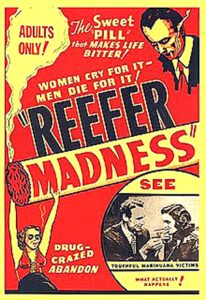EDITORIAL
‘Reefer Madness’
Goes Mainstream

Maybe when marijuana vendors appear at Disney World, or when the venerable theme park comes up with a Marijuana Mile theme ride, or maybe Marijuana Maelstrom.
Then, perhaps, the Village of Cooperstown – “the pinnacle” of youth baseball camps, according to Lunetta Swartout, Cooperstown Stays proprietor, (and she ought to know) – should approve pot shops, or a “recreational cannabis dispensary,” or whatever, along Main Street in Baseball’s Mecca.
Maybe then, but now the debate is more than theoretical.
Simmering, simmering for years, marijuana legalization moved to the front burner over the weekend, when Governor Cuomo and the leaders of the state Senate and Assembly agreed on legislation “to legalize adult-use cannabis.” The Assembly and Senate approved the bill Tuesday, and Cuomo was expected to sign it.
The Cannabis/Marijuana Regulation & Taxation Act would, among many other things:
• Create two licenses, one for pot farms, a second for pot shops.
• Impose a 9 percent state excise tax on the wholesale level, fed into a newly created state Cannabis Revenue Fund, which after “reasonable costs” for administration and enforcement, would be split 40 percent to education, 40 percent to “community reinvestment,” and 20 percent for drug treatment and community education.
• Allow a 4 percent local tax on the retail level, of which 25 percent would go to the county, 75 percent to the host municipality.
• Set limits and regulations governing what citizens can grow in their backyards for their own use. (Six mature plants and six immature per household. Holy smokes, Batman!)
There’s much more – for details, check the Governor’s Office press release on www.AllOTSEGO.com – but most debated locally is the opt-out possibility, which allows cities, towns and villages to prohibit “retail dispensaries or on-site consumption licenses” through passing a local law by Dec. 31.
In 2019, the Republican-dominated county Board of Representatives seemed partial toward opting-out. As described in the legislation, however, that decision will not devolve to localities: cities, towns and villages.
Cooperstown Village Trustee Mac Benton has already called for taking full advantage financially of the legislation. “It’s going to be great for businesses, it’s going to be great for farmers, it’s going to be great for racial justice. It’s going to be great for a lot of things,” he declared.
The trustees, meeting Monday, March 22, staved off Benton’s initiative, waiting-and-seeing until the law passes, which almost certainly will happen by this month’s meeting on the 26th. So a day of, if not decision, rumination, is nigh.
•
On the face of it, opting-out seems sensible for Cooperstown. The family-friendly ambience in “America’s Most Perfect Village” should be treasured and protected.
In an interview, Mayor Ellen Tillapaugh Kuch pointed out that, even if pot smoking is legal, the village’s new law applying to vaping in parks and the Doubleday Field complex could be expanded to rule out marijuana as well.
Perhaps an opt-out could be structured to bar pot shops on Main Street, and still allow them on, say, Railroad Avenue, which already hosts the Cooperstown Distillery and might be developed as an “entertainment district.” Perhaps zoning-code revisions could enable that.
The opt-out doesn’t allow the village or any New York State locality to ban pot-smoking outright. It will be legal statewide under the new legislation.
Happily, the opt-out legislation doesn’t have to be adopted for nine months, giving plenty of time for public discussion – and a poll, maybe – to determine how much regulation the community may or may not want.
•
There are other oddities in the legislation.
For instance, 50 percent of the licenses must go to minorities, women, distressed farmers or service-disabled veterans. Is that even constitutional, creating a new industry and restricting participants by race and gender?
The governor says that’s “all about justice for long-marginalized communities.” We seem to remember, though, that the draconian Rockefeller Drug Laws ruined many young lives across the board. If we’re going to now reward one sector, should all victims of what we now say was an unjust regimen get the same consideration?
Another oddity: The law says legal marijuana, if kept at home (instead of where?), “must be kept in a secure location, away from children.” Really? What about beer in the fridge? Will that soon come under police jurisdiction as well? Or aspirin, or sharp knives, or (occasionally biting) dogs?
•
As far as legalization, it’s a shame that “Reefer Madness” is going mainstream. In a certain percentage of the population, marijuana can be devastating. But, for that matter, so is beer, wine and liquor.
Approached systematically over decades, imbibing alcoholic beverages has been in decline. Drunk-driving deaths are down 80 percent in 20 years.
The new legislation will also fund a “Public Health & Education” campaign. Perhaps problems associated with pot smoking, once out in the open, can be systematically addressed, the way alcoholism has been as well.
Onward and upward.

